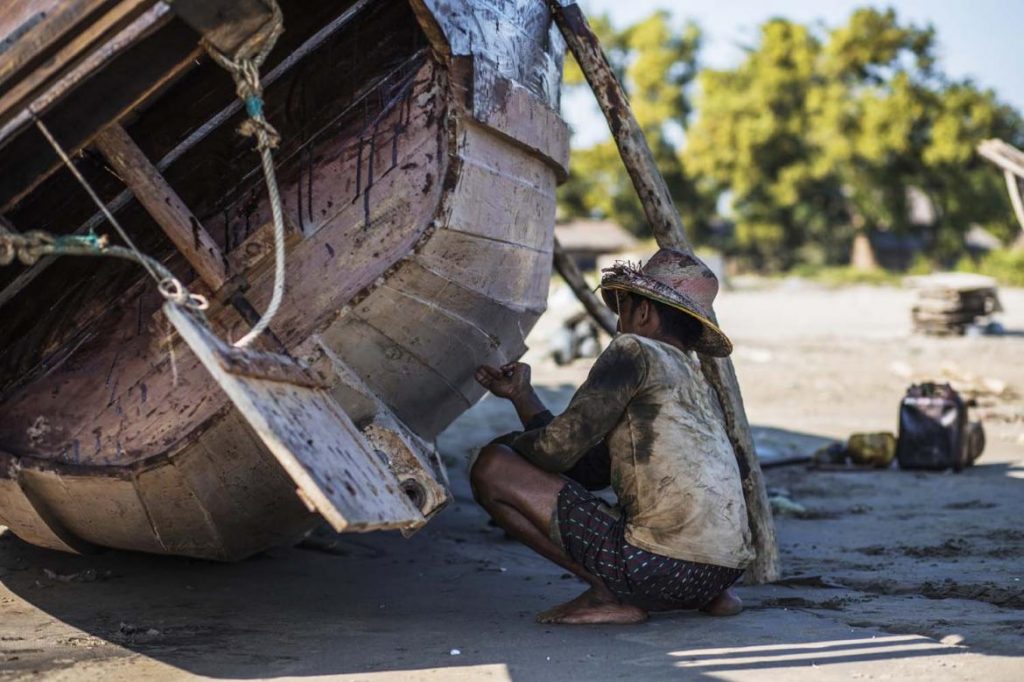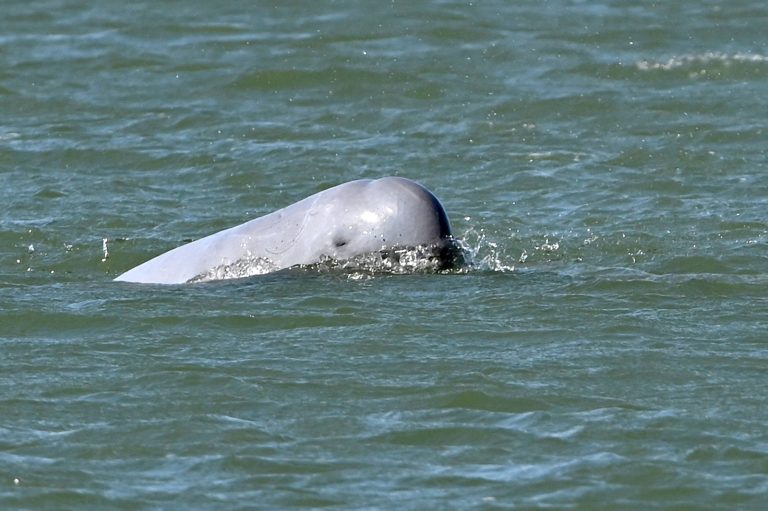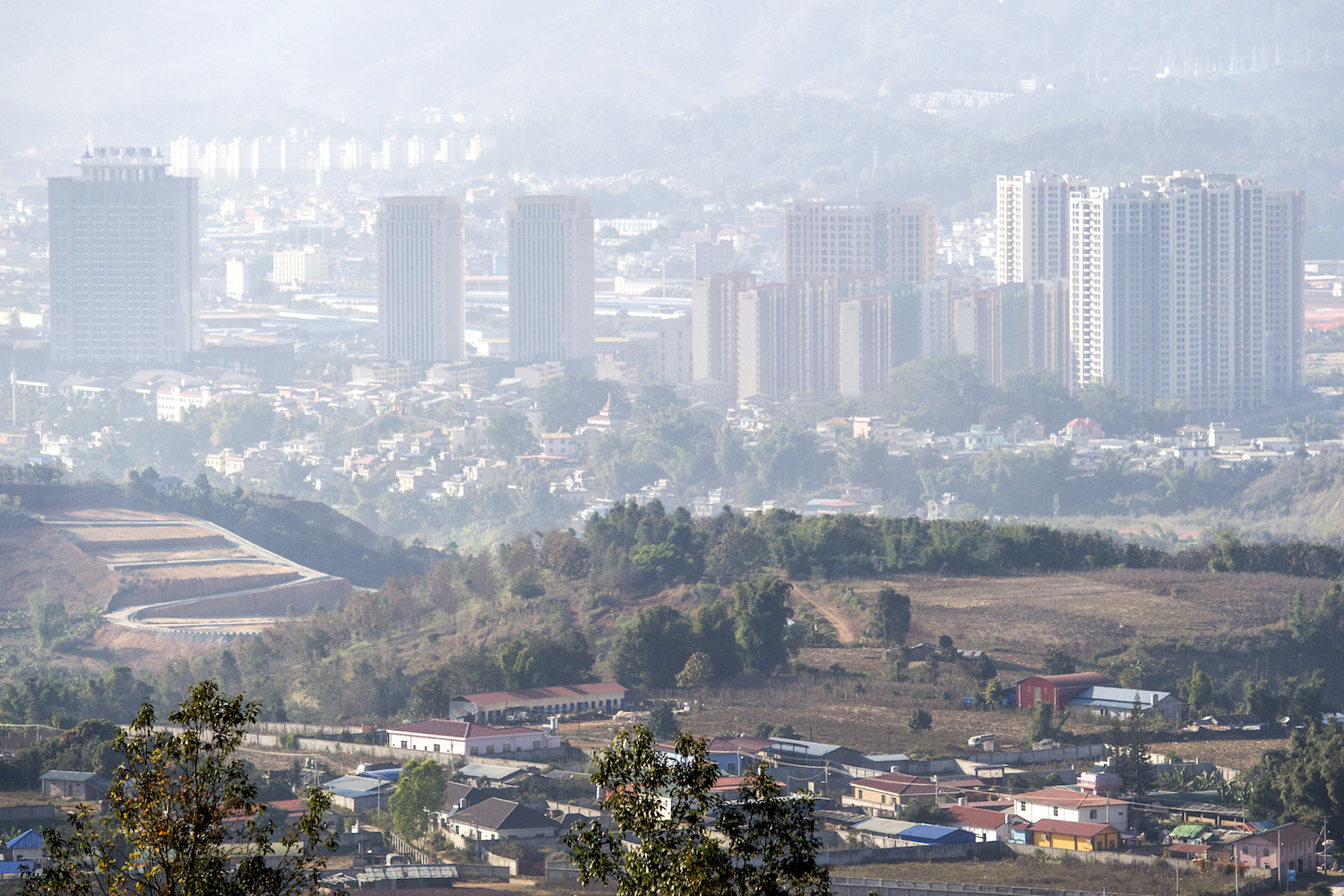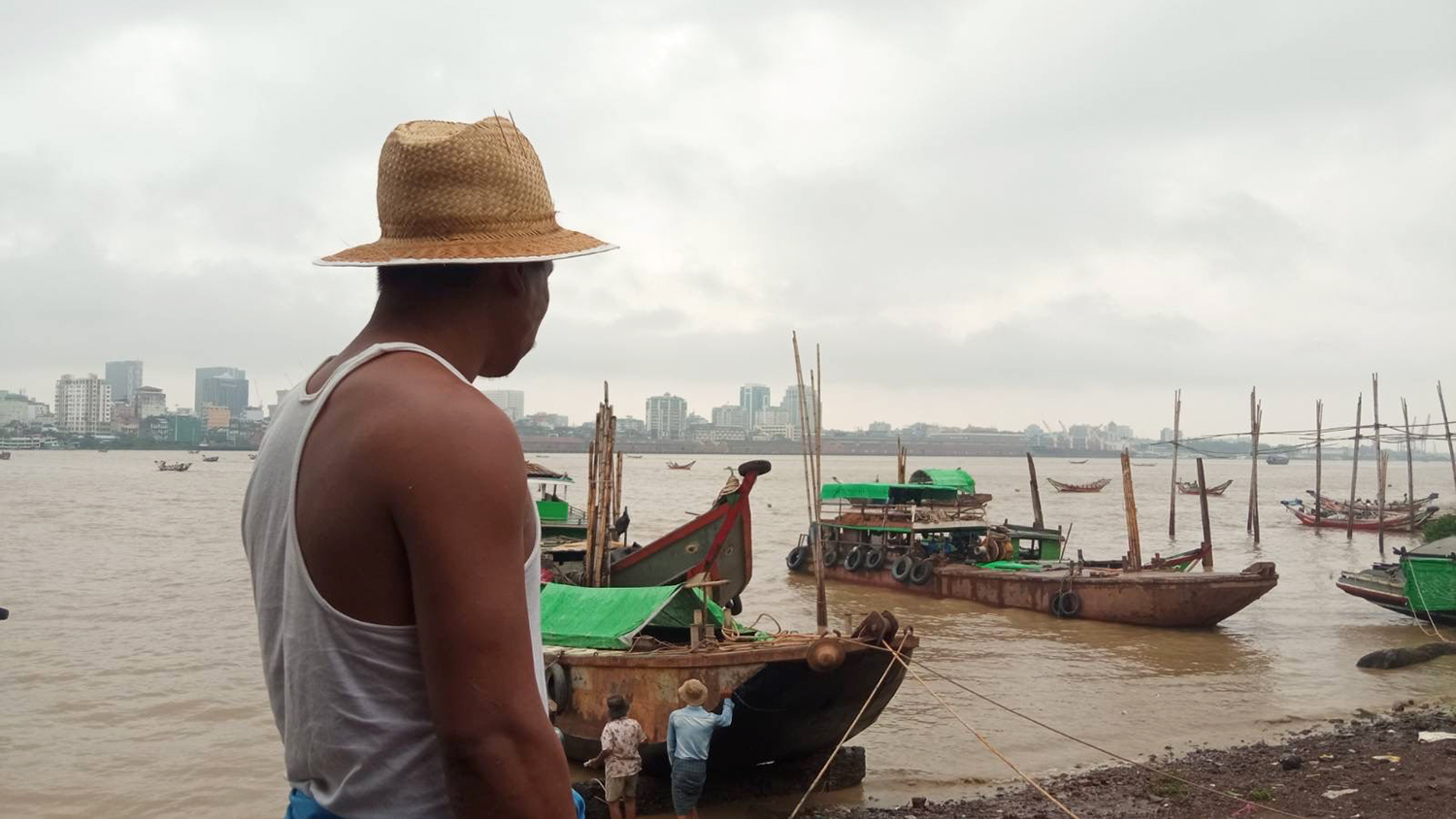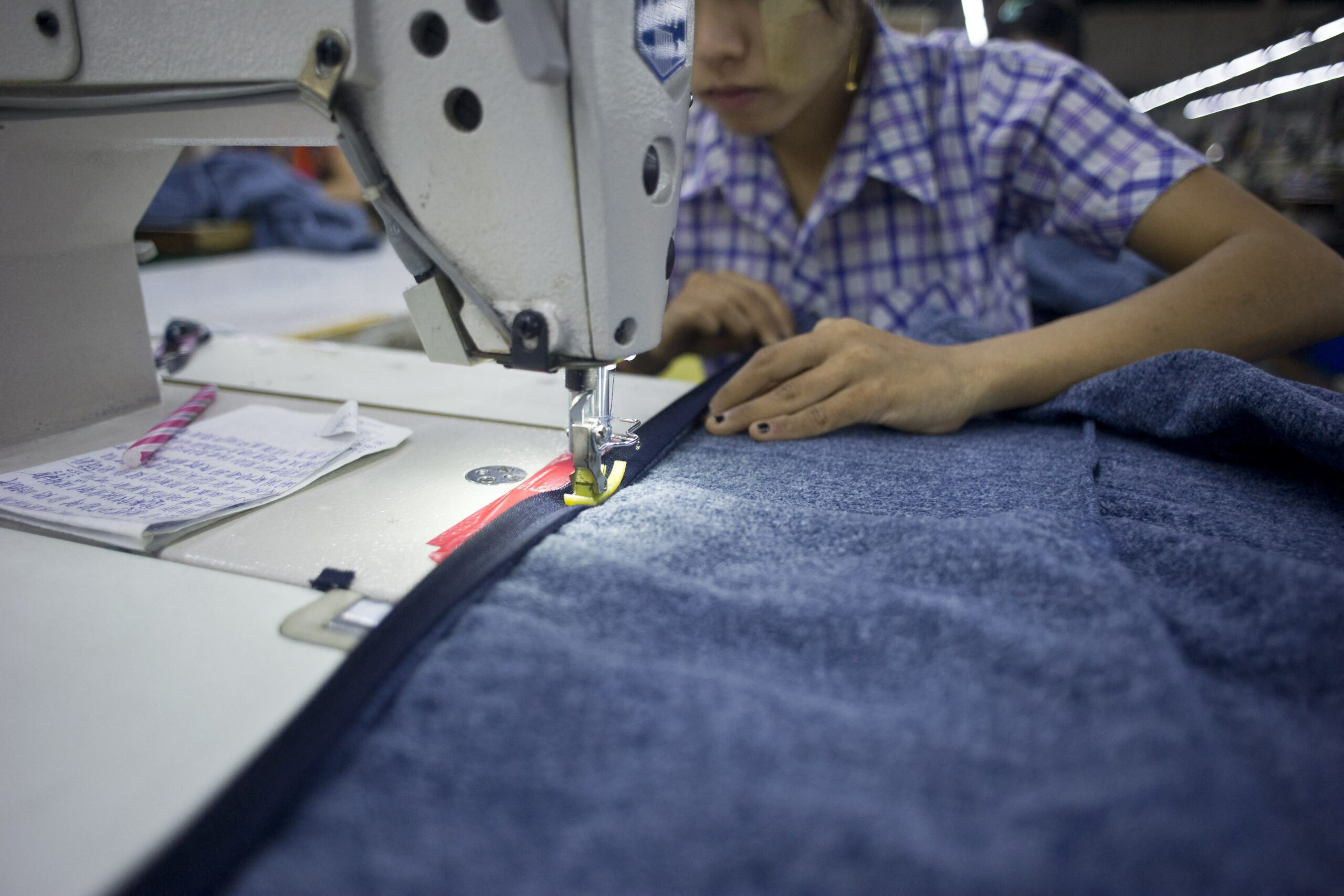Workers spend eight months without break on fishing rafts moored off the Ayeyarwady Region coast, enduring beatings and deprivation to keep Myanmar supplied with fish paste.
By HEIN THAR | FRONTIER
A DEJECTED Daw Myint Myint San was sitting in the small room of the labour office in Ayeyarwady Region’s Pyapon Township, nodding as if she understood what the labour officer was saying.
The labour officer, a woman, was brandishing a book of labour law regulations and speaking loudly.
“It clearly states in the 1923 law that you cannot get compensation unless you have a death certificate,” the labour officer said. “How can I believe your husband is dead unless you can produce the death certificate?”
“But officer, my husband died at sea and his body has not been found,” Myint Myint San replied. “How can I show you a death certificate?”
Support more independent journalism like this. Sign up to be a Frontier member.
Her husband, U Zaw Oo, left their home in Kweh Lweh Yo Seit village in Ayeyarwady’s Myaungmya Township last August to work on one of the fishing rafts off Pyapon, which are notorious for labour abuses. In October, Myint Myint San received a phone call from her husband’s employer to say he had drowned while trying to escape from the raft.
Asked where her husband died, Myint Myint San points to the big distributary of the Ayeyarwady River that flows through Pyapon on its way to the sea.
The employer offered Myint Myint San K600,000 (US$402) in compensation for the death of her husband. Thinking the amount too small, she complained to the labour office in Pyapon.
However, under the 1923 Workmen’s Compensation Act, which was amended in 2005, Myint Myint San is entitled to receive compensation of only between K150,000 and K450,000 from the employer for the death of her husband if she has a death certificate. If her husband had paid into a social security fund, she might expect a higher amount, but it’s unlikely that any workers on the rafts have such protection. Myint Myint San had no choice but to accept the K600,000.
“I’ve been deprived of a husband, but they have only given me K600,000,” she said. “How can I manage with three children?”
As Myint Myint San left the labour office, she cursed the kyar phaung (tile rafts), the bamboo fishing rafts launched from Pyapon, which are named after the “tile nets” that workers cast from their sides to catch fish.
img_1102.jpg
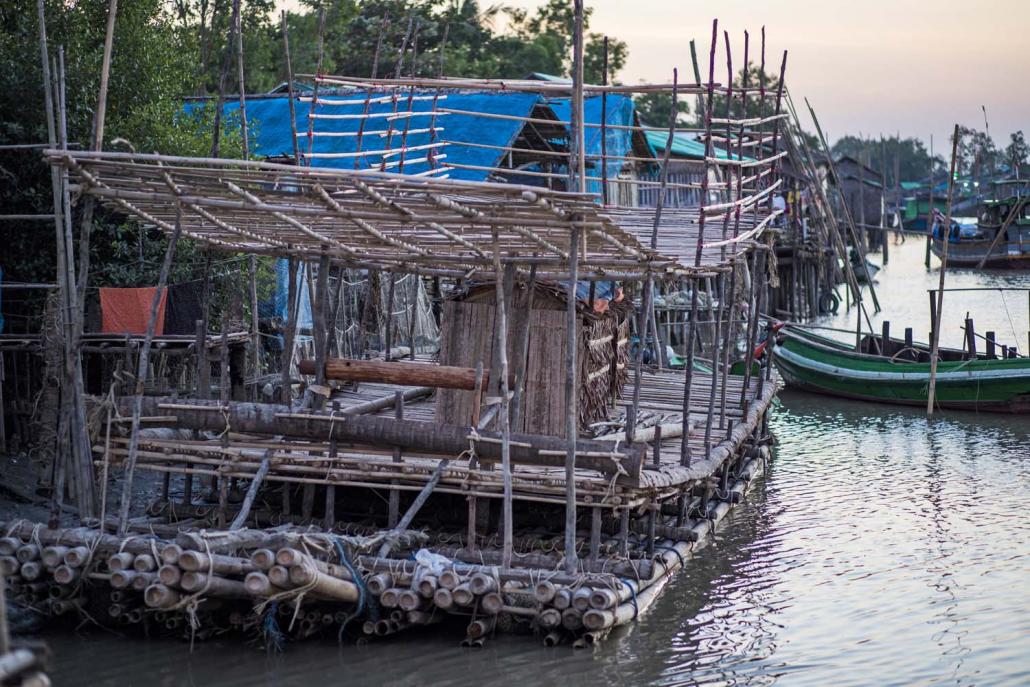
A kyar phaung fishing raft moored at Khabyat village in Pyapon Township. (Samuel Harrison | Frontier)
Trafficked, tortured, released
Pyapon takes its name from a Mon term for a row of restaurants. Under the Mon kings, who ruled over lower Myanmar before being conquered by the Bamar Konbaung dynasty in the 18th century, Pyapon had the best restaurants in the delta because of its position near the coast in an area where fish and prawns were abundant.
The town has also long been famous for the quality of its fish paste, called ngapi, the pungent, salty condiment that is integral to a Myanmar meal. Some consider Pyapon ngapi to be the country’s best. The Myanmar Fisheries Federation says Pyapon Township produces 80 percent of the ngapi and dried prawns consumed throughout the country. This huge demand is satisfied by the fishing rafts moored off Pyapon.
The bamboo rafts are about 100 square feet, or nine square metres, and a crude shelter with a stove sits on the lower of two decks. They are towed as far as 100 kilometres out to sea, where they are anchored. Each raft is manned by up to four workers, including a supervisor.
Fish and prawns caught in nets are boiled before being sun-dried on the top deck of the raft. The fish and prawns are collected from the raft every three to five days by a boat that also delivers water, rice and vegetables to the raft crew. The rafts are anchored in position for the duration of the catching season, which lasts from September to April, before the arrival of the monsoon, and the crew is expected to live on the raft for the whole eight months. Anyone who leaves before the season ends has to return all their pay.
The notoriously brutal working conditions on the kyar phaung, out to sea and far from view, have been under scrutiny since a 20-year-old university student was trafficked onto a raft.
Ko Myat Thura Htun, a history major at Yangon’s Dagon University, was abducted by “brokers”, as traffickers are called, on October 2 and sold for K700,000 to work on a fishing raft. He toiled on the raft for about 45 days before being released when his family reportedly paid K700,000 to the raft owner.
On leaving the raft, Myat Thura Htun displayed injuries consistent with having been tortured. Part of an ear had been cut off, his arm was broken and there were bruises and cuts all over his body.
The Myanmar Police Force’s Anti-Human Trafficking Task Force was preparing to file charges against two people – a broker, Ba La Gyi, and a raft supervisor, U Kyaw Aung – over the trafficking of Myat Thura Htun, who was reportedly targeted for physical abuse on the raft because he was a slow worker. However, Kyaw Aung died in detention in mid December, police say because of a stroke. The case against Ba La Gyi under the 2005 Anti-Trafficking in Persons Law had not gone to court at press time.
ATTF spokesperson Major Khin Mg Kywe told Frontier on December 24 that of 200 reported human trafficking cases in 2019, 19 related to offshore fishing rafts, which only operate off Ayeyarwady and Tanintharyi regions. All but two of these cases were in Pyapon.
However, fishing rafts continue to operate unregulated and largely beyond the reach of law enforcement. Khin Mg Kywe said anti human trafficking police only responded on receiving reports with “exact information”.
The case of Myat Thura Htun, which was widely reported in the media, moved the Myanmar National Human Rights Commission to action and a team under commissioner U Yu Lwin Aung travelled to Pyapon on December 2 for the purpose of inspecting the rafts. The visit was a fiasco. Rough weather meant they needed a larger boat than any of the available vessels to travel to the rafts out at sea, and the team left Pyapon on December 6 after interviewing raft owners, supervisors and workers in the villages on the shore.
Yu Lwin Aung told Frontier on December that he wanted to make a return trip to visit the rafts. He did not say when this might happen, or when the commission’s report and recommendations would be published.
img_0996.jpg
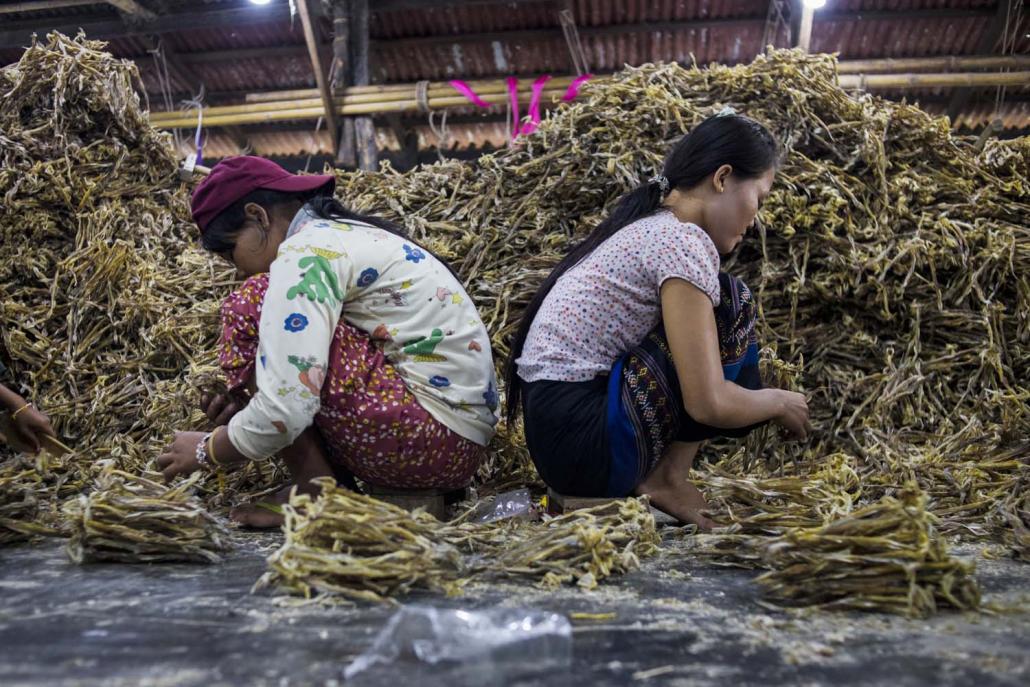
Dried fish are processed at a warehouse in Khabyat village. (Hein Thar | Frontier)
Out of sight
“We are legal enterprises, but I admit there are illegal things happening,” U Than Chaung, chairman of the Pyapon Township Kyar Phaung Fishery Enterprises Association, told Frontier in an interview in his office. Than Chaung once operated fishing rafts, but for the past 20 years has served as chair of the association.
Than Chaung says there are about 120 raft operators at Pyapon, who own about 1,000 rafts, and the industry employs about 10,000 workers, including about 4,000 who work offshore.
The fishing raft industry at Pyapon Township operates out of three villages on the coast about 50 kilometres from Pyapon town. They include Daw Nyein village, where most local residents now refuse to work on the rafts because they do not want to live out at sea on the flimsy structures for eight months a year.
“It’s exhausting work; we laboured day and night and got only a few hours’ sleep,” said U Myint Tin, a resident of Daw Nyein village who worked on the rafts for seven years before stopping in 2016, and now fishes from his own boat. “When you get off the raft, your complexion is as black as a buffalo.”
Because of an acute labour shortage, raft owners rely on brokers to recruit workers, most of whom are not trafficked. Each September, these brokers bring truckloads of migrant workers to Daw Nyein village and introduce them to raft owners.
The labour shortage also means that the employers never screen the workers. “They might include criminals who have committed murder, or escaped inmates,” said Than Chaung, adding that the overwhelming majority do not have identity documents.
For the workers, the biggest attraction of toil on the rafts is being paid in advance. Depending on their skill, they can expect a lump sum of between K700,000 and K800,000, but they must sign a pledge to return the money if they leave the raft for any reason before the end of the eight-month fishing season.
“The workers are interested in working on the rafts because we pay them a big sum in advance. If we do not pay them in advance, they will not do this work,” said U Htay Oo, a fishing raft owner at Daw Nyein village.
The Department of Fisheries forbids any one owner or company from operating more than eight fishing rafts. However, the regulation is flaunted by most raft operators, some of whom own up to 50 rafts.
“No one complies with this rule because the government never conducts inspections or takes action against those who do not comply,” said Than Chaung.
Wealthy fishing raft owners live in Pyapon town or next to warehouses in villages where the catch is unloaded and sorted. They hire well-built men known as oo zee gyoke who play the role of enforcers and travel back and forth on boats to inspect work on the fishing rafts and collect their catch.
The oo zee gyoke are paid a percentage of the value of the catch, which gives them an incentive to push the workers hard.
“A bad oo zee gyoke beats workers who don’t do what he asks them to,” said U Myint Tin, 50, a former raft worker who lives in Daw Nyein village. “Sometimes the workers are beaten so badly they are crippled for life; at other times they are beaten to death and their bodies dumped in the sea.”
“Sometimes the workers on the raft fight amongst themselves,” Than Chaung said. “Fights at sea are unavoidable.”
A small government hospital at Daw Nyein village recorded 102 raft worker deaths at sea in 2017, 82 in 2018 and 80 this year to end of November.
However, the hospital superintendent Dr Min Nyan Paing Aung said they only count people whose bodies are returned to shore and not those whose bodies are dumped at sea.
Because the rafts are generally beyond mobile phone reception, when a worker is injured or supplies run out, the crew unfurls a white flag from the centre of the raft to alert an oo zee gyoke. When a crew member dies, the survivors place the flag at the head of the raft.
thuya_zaw-5.jpg
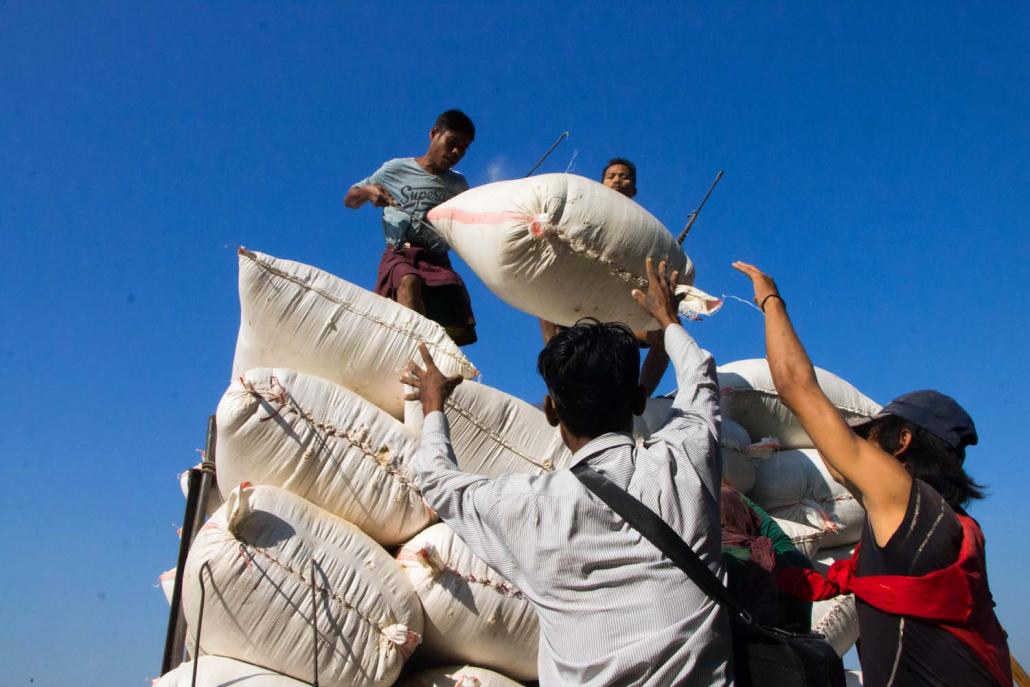
Bags of dried fish from Pyapon are unloaded from a boat to a warehouse at Yangon’s Bayintnaung market. (Thuya Zaw | Frontier)
The smell of ngapi
When Frontier visited Daw Nyein and the nearby village of Khabyat in December, the air was filled with the pungent odour of ngapi and dried fish.
The area bustles with brokers during September when the season begins, said Daw Nyein resident Daw Maw Maw San.
“There are good businessmen and there are bad businessmen, and it is because of the bad businessmen that this business is notorious,” she told Frontier.
The raft owners have many warehouses in the village, where dried fish and prawns are cleaned before being packed and transported to the huge Bayintnaung agricultural commodities market in Yangon’s Mayangone Township.
“We worry about workers dying on the rafts because it means we lose part of our workforce and have to pay compensation as well,” said U Bo Myint Than, who owns 80 rafts.
The raft owners say they need to exercise close control over the workers to ensure they do not flee after taking their advance payment. It was also not unknown for workers to pretend to go missing at sea so their families could claim compensation, they say.
“Not everyone exploits and bullies the workers; there are also honest businessmen,” said Bo Myint Than.
After media scrutiny of the industry intensified thanks to the case of the trafficked student, the Myanmar Fisheries Federation held a news conference in Yangon on November 26. At the event, MFF secretary U Win Kyaing urged the media not to report misinformation about labour abuses at Pyapon because it could harm the ngapi and dried fish business.
Despite the importance of Pyapon in supplying the national market for ngapi and dried fish, the Pyapon Township fishery department was unable to provide Frontier with the production figures. This is partly because raft owners do not complete goods movement documents as required by fishery department regulations.
U Soe Win Naing, chairman of the Association of Fish Paste, Dried Fish and Fish Sauce Entrepreneurs, told Frontier there were 12 sales centres at Bayintnaung market that each day receive up to 2,000 bags of ngapi, each weighing about 80 kilogrammes.
There is no part of the country that does not buy ngapi, Soe Win Naing told Frontier. “You can say that ngapi is political because if the cost of ngapi goes up, people throughout the country will complain,” he said.
If the fishing rafts off Pyapon were made to operate according to the law the ngapi business would suffer, Soe Win Naing said, describing a difficult trade-off between humane labour standards and a viable industry offering cheap food for the nation’s poor.
“There are illegal methods of mobilising workers and recruiting them in the fishing raft business and if they are stopped, the production of ngapi will surely be affected,” he said. “But if action was taken against the illegal practices, we would be able to eat ngapi with a clear conscience.”


